Exploring Southwest USA: Antelope Canyon and Zion National Park
I was staring for some time before my eyes adjusted to the light in the narrow sweeping passageway and made sense of what our Navajo guide was saying.
“Can you see the bear?” he asked without alarm in his voice.
“Oh yes,” our group finally replied in unison, equally calm. Luckily, we were not having a close encounter with a grizzly. Instead we were in Antelope Canyon, Arizona, and our guide was merely drawing our attention to one of the more unusual formations visible in the elegantly sculptural walls.
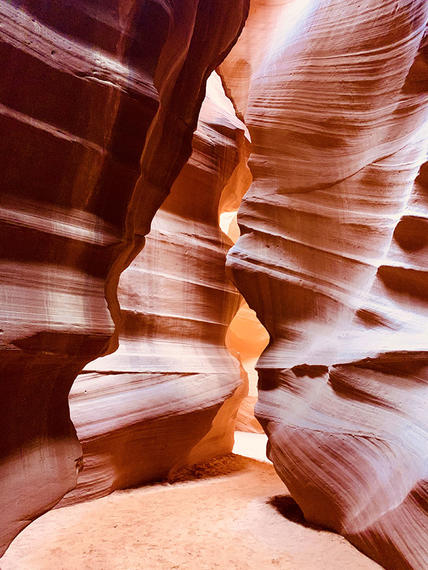
Antelope Canyon
Carved by flash flood waters, the Navajo name for this sandstone slot canyon quite rightly translates as 'the place where water runs through rocks', and the flowing waters have indeed etched a permanent echo in the swirling shapes that surround us.
As we made our way from one atmospheric chamber to the next, each time our guide pointed his torch required a new twist of the head. And one by one the canyon’s walls revealed a “flame”, a “heart” and finally the “wave” – apparently made famous by an Apple screensaver.
It was too overcast, unfortunately, for the signature shards of light to penetrate the roof of the canyon, but this in no way diminished our enjoyment of this immensely beautiful passageway. To increase your chances of seeing this, make sure you visit in summer from late morning to early afternoon when the sun is at its highest.
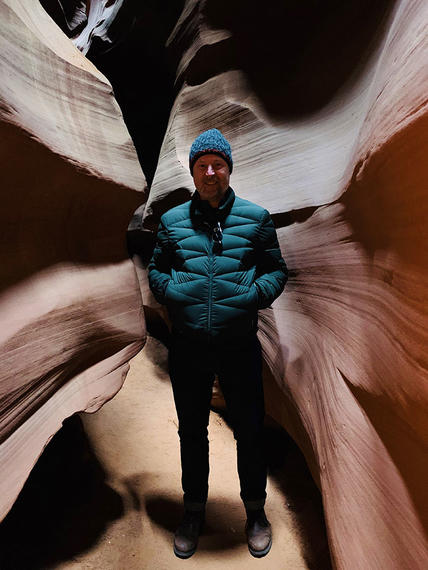
It’s also essential to see Antelope with a Navajo guide. We’d overnighted in Page, Arizona, located on the shores of Lake Powell, so were perfectly placed to join an official tour from the booking office located on the town’s high street. From there we were taken to the Upper Antelope Canyon, also known as "The Crack", via four wheel trucks. It’s more easily accessible than Lower Antelope Canyon, with no climbing required.
We didn’t have to worry too much about the details, because everything had been taken care of by Joel, our Bindlestiff Tours guide, this being day three on their Southwest National Parks adventure. Our next stop on the schedule may just have been around the corner, but being able to leave the logistics to Joel certainly made it easier to make the most of the day, as our third stop that afternoon was Zion National Park, over 160 kilometres away.
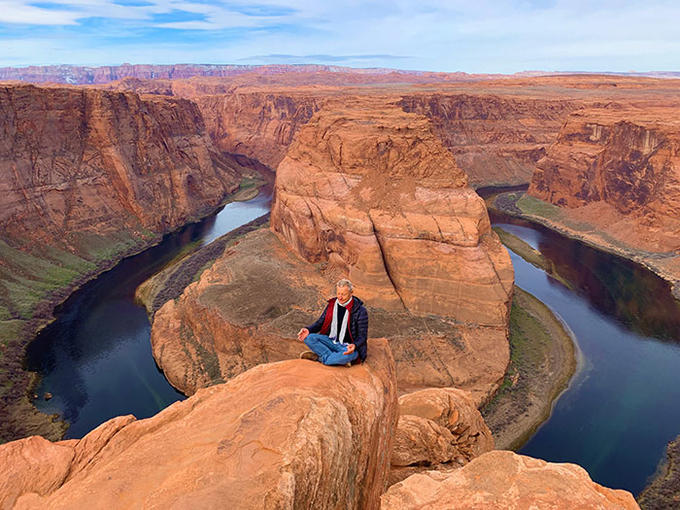
Horseshoe Bend
First though Joel took us a few miles down Highway 89 to Horseshoe Bend, which is fast becoming the most recognisable U-turn on the planet. On reaching the overlook after a short hike, everyone - including me - took turns to venture to the edge of a particularly precarious outcrop jutting out into the sky. And taking our cue from the Instagram influencers that have made this looping stretch of the Colorado River famous, we all snapped the obligatory shot of our feet daggling over the edge.
All that is, except David, a former lawyer from Australia who, as we’d learned from our tour bus banter, now teaches yoga. Given the sheer drop, everyone else had tentatively inched their way to peer into this part of Glen Canyon. In contrast, David calmly walked to the edge before turning around and adopting a seated pose with his back to the epic bend. He looked completely serene, but several onlookers, myself included, were having palpitations just watching. Thankfully, he stopped short of doing a headstand.
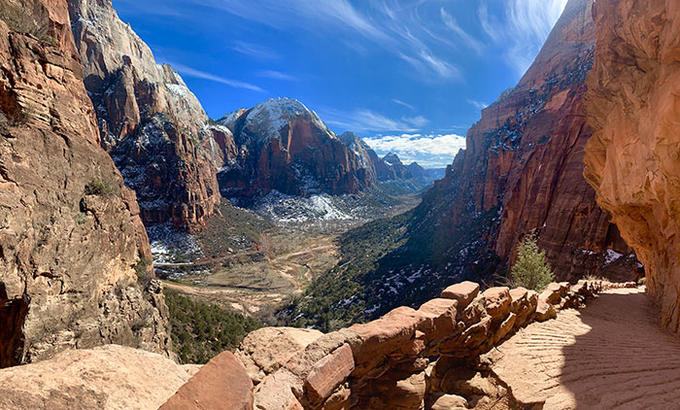
Zion National Park
Heart rate returned to normal and back on the bus, there was time for a quick stop at Glen Canyon Dam and get a better look at Lake Powell, the reservoir it’s created. As we headed to Zion National Park, the landscape changed from flat desert to more mountainous terrain, the trees became taller and surrounded by snow.
It prompted Joel to ask a question when we reached the park entrance: “What’s the Angel Landing trail looking like today?”
“The snow is melting but it’s still a little icy on the shaded parts of the trail,” the Ranger responded.
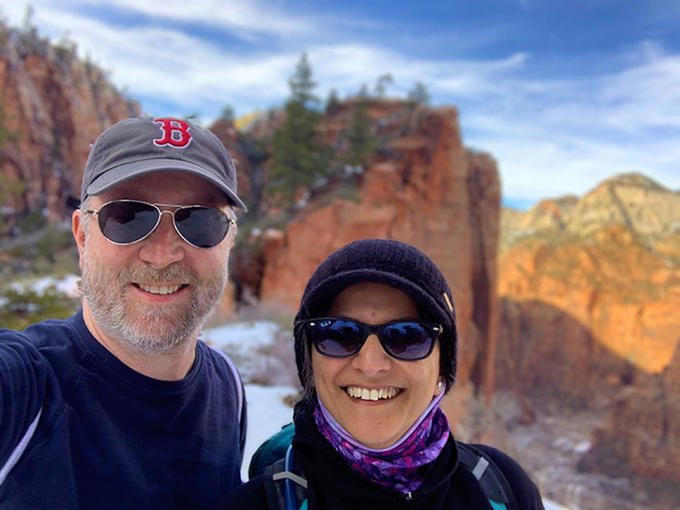
Zion Canyon
As we wait for an oncoming larger vehicle to clear the tunnel that will bring us into Zion Canyon, Joel brought us up to speed on Angel’s Landing, one of the most challenging trails in North America, rising as it does 1,488 feet above Zion Canyon floor and with a precarious final section.
Encouraging us to undertake the hike, nonetheless, he explained how the first part of the trail is made up of a gently ascending and well-established paved path that also affords incredible views of the valley.
“Try to make it to Scout’s Lookout and take a view on the conditions before deciding about the final section.”
We set off to find the spring melt in full swing, with streams of water finding their way down the cliff face and creating tiny waterfalls along the snow-free part of trail.
“None of this was here this morning,” a returning hiker informed us as we passed each other on the path.
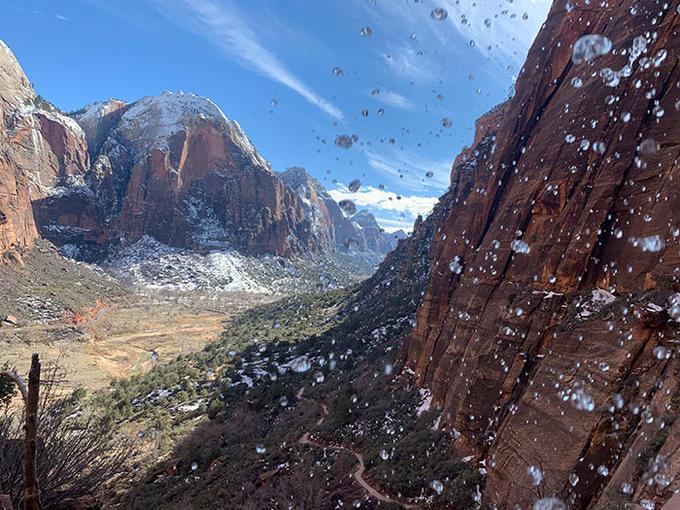
Before turning into a fully shaded section of the trail, we looked behind us to take in the full stretch of the canyon. Framed by a perfect blue sky, the red, orange and pink peaks on the other side of the valley descended into the green forest floor. It dawned on me I simply had no concept of Zion Park’s rugged beauty. It’s a revelation.
Leaving the sunny valley behind us, we made good progress until we reached a set of 21 steep zig-zags known as Walter’s Wiggles. Still fully shaded, the ice on the path had been made more difficult to negotiate by the day’s early walkers who clearly slid down the path on their return.
It was slow going and the constant slipping caused much laughter, but we eventually made it to Scout’s Lookout. The tricky switch backs made our next decision easy. After taking a moment to enjoy the new vistas of the valley, it’s our turn to slide back down the mountain, which caused even more hilarity. Angel’s Landing, and the magnificent views it affords in every direction, will have to wait until we return.
Phil explored the Southwest on the three-day Winter National Parks Tour operated by Bindlestiff Tours. In winter, the tour departs Las Vegas on Monday from November to March. A summer version of the tour departs on Mondays, Thursdays and Saturdays from April to October, with an additional camping option as well as lodging. Ask your Travel Consultant about adding one of these tours to any West Coast USA Journey, one of many adventures you can enjoy with Bindlestiff Tours across the US Southwest, Western Canada and Alaska.




